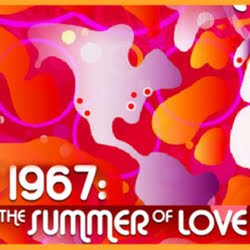.jpg)
The “Summer of Love” is a time when music, art, literature, and lifestyles changed into a more psychedelic style that became popular across the western world. San Francisco’s Haight-Ashbury district was the central source for this social phenomenon. It was the heart of the hippie revolution and a blend of music, psychoactive drugs, sexual freedom, creative expression, and politics.
Hippies, from 1965 until the summer of 1967, saw themselves as the witnesses of a new age where “The Man” would fall while peace and spirituality would over power. Gandhi and Martin Luther King were their heroes as they turned to the rich heritage of Asian mysticism and metaphysics for their inspiration and practice. Peace and love were not just slogans to them, but were states of mind and a way of life. One major component of the “Summer of Love” time period was their music. Some popular artists of the time were The Grateful Dead, Country Joe and the Fish, and Big Brother and the Holding company. The style of the music was untimed, un-planned, and imprecise; basically very “free-formed”. The music was mostly a combination of blues, small local bands, folk music, and indie sounds and it was these sounds partnered with the unusual use of the stereo is what gave the music its psychedelic feel and made the music so memorable.
 The music had a relationship that symbolically related to the drugs used during the Summer of Love. Drugs, like cannabis and LSD, were a major part of the Summer of Love. The reason these drugs were used were because they were connected with beliefs of personal growth and enlightenment and were, in some ways, natural and they believe LSD could connect them with nature. Hippies desired enlightenment because they rejected the consumerist culture and war. However, on October 6, 1967 the remaining residents staged a mock funeral, called “The Death of a Hippie”, to indicate the end of the played out area, because overpopulation, homelessness, drug addiction, and rising crime killed the party.
The music had a relationship that symbolically related to the drugs used during the Summer of Love. Drugs, like cannabis and LSD, were a major part of the Summer of Love. The reason these drugs were used were because they were connected with beliefs of personal growth and enlightenment and were, in some ways, natural and they believe LSD could connect them with nature. Hippies desired enlightenment because they rejected the consumerist culture and war. However, on October 6, 1967 the remaining residents staged a mock funeral, called “The Death of a Hippie”, to indicate the end of the played out area, because overpopulation, homelessness, drug addiction, and rising crime killed the party.-Paris Crockett
No comments:
Post a Comment